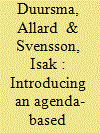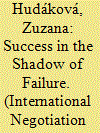| Srl | Item |
| 1 |
ID:
165681


|
|
|
|
|
| Summary/Abstract |
Previous quantitative mediation research has relied on generalized measurements of “mediation success,” such as agreements, ceasefires or peace durability. However, these measurements of success do not take into account what mediators were mandated to achieve. We propose benchmarking outcomes against the explicit mandates of the interventions, a novel way of conceptualizing mediation success. Utilizing data on the agendas of mediated negotiations in intrastate armed conflicts in Africa between 1990 and 2010 as a proxy for mediation mandates, we examine the relative effectiveness of manipulation as a mediation strategy. The study shows, in contrast to previous research, that third party manipulation does not have a significant effect on whether the goal of a given round of negotiations is achieved and, that under some circumstances, may decrease the likelihood of mediation success. We discuss the opportunities as well as limitations of a mandate-based approach to the study of mediation success.
|
|
|
|
|
|
|
|
|
|
|
|
|
|
|
|
| 2 |
ID:
183955


|
|
|
|
|
| Summary/Abstract |
Over the past few years, Yemen has become synonymous with mediation failure. This contrasts sharply with the situation in the early 2010s, when the United Nations played a crucial role in persuading Yemen’s long-serving President, Ali Abdullah Saleh, to step down from power and, at least initially, successfully steered the country during the ensuing political transition. By analyzing UN mediation efforts during the mandate of Special Adviser Jamal Benomar, the article draws attention to the multiple shifting benchmarks for success. It adopts a phase-differentiated approach to mediation evaluation, which not only allows for recognition of earlier successes, but also enables an analysis of relevant factors influencing mediation success or failure in different stages of the mediation process. In the final instance, the analysis suggests that the eventual failure of UN mediation in Yemen can be traced to conflict and contextual factors rather than the mediator or the mediation process.
|
|
|
|
|
|
|
|
|
|
|
|
|
|
|
|